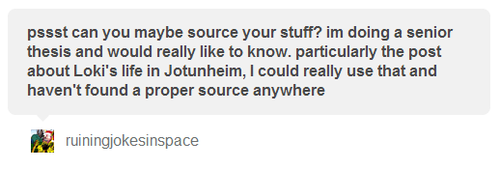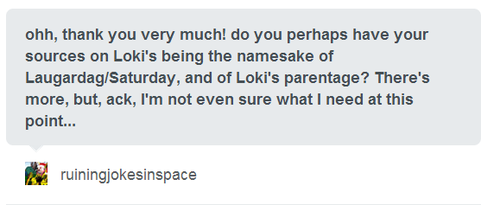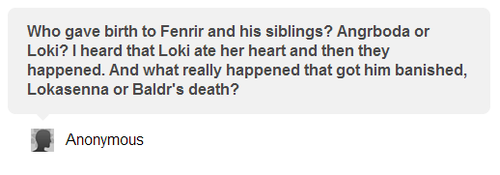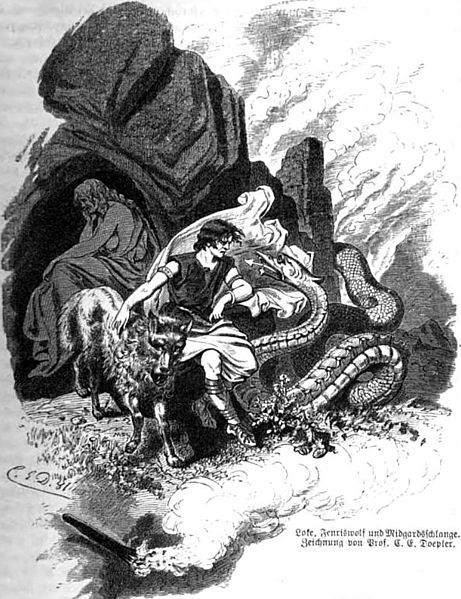#loki laufeyiarson

Of course! I hope this is a good way to do it - I’m not very tumblr-savvy…

I’ve been meaning to start sourcing everything, but it will probably take a bit of time, since a lot of the information is just kind of my accumulated knowledge (I’ll do my best though!). About Loki’s life in Jotunheim specifically, let me see… I know the first time I read about it was in The Norse Myths by Helena Yvette Grimes, but that book is not really an academic one, and it’s very inaccurate in some parts. This website’s (http://shadowlight.gydja.com/loki.html) info on the subject is accurate and well-written, but this website is not academic either. Myths of the Norsemen by H.A. Guerber, an academic text, touches on Glut, Eisa, and Einmyria in chapter 22 (http://free.sbooks.net/H_A_Guerber/Myths_of_the_Norsemen/kindle.html), but not in exceptional detail. From a cursory sweep of my sources that I expected to have the right information, that is what I’ve found. Let me know if you want me to find more sources. I know there ARE more, but I’d have to reread a lot of material to locate the others. I definitely don’t mind doing this, since I should have been citing my sources from the beginning. Also, it’s always good to refresh knowledge. So just let me know if you’d like me to dig a little deeper. Thanks for bearing with me!

I’m so sorry for not responding sooner! The Laugardag/Saturday is also primarily from H.A. Guerber’s Myths of the Norsemen. Loki’s parentage is a bit trickier, because nearly every piece about Loki will mention Loki’s parentage, but they all say different things. It’s because no one is quite in agreement on Loki’s true origins. For that reason, what I’ve posted here might not even be the most accurate answer.
The H.A. Guerber text cites the three different possibilities of Loki’s parentage, in chapter 22 like the information on Eisa, Einmyria, and Glut. [1]One possibility is that Loki was among the family of original gods with Odin and Hoenir, since the three make up a common triad. There is also the possibility that Loki was:
“[2]the son of the great giant Fornjotnr (Ymir), his brothers being Kari (air) and Hler (water), and his sister Ran, the terrible goddess of the sea. Other mythologists, however, make him [3]the son of the giant Farbauti, who has been identified with Bergelmir, the sole survivor of the deluge, and of Laufeia (leafy isle) or Nal (vessel), his mother” (Guerber).
I’m sorry to keep suggesting the Guerber text, but many other mainstream texts are painfully inaccurate (with respect to older sources and artefacts) and suffer from some form of factual distortion. This is one of the few that doesn’t, so it’s a good source of information.
This (http://shadowlight.gydja.com/loki.html) well-informed/written but non-academic site that I’ve suggested before details Loki’s descent from Farbauti and Laufey.
I’m fairly certain that Rudolf Simek’s Dictionary of Norse Mythology provides a good explanation on Loki’s parentage, but I don’t know on which page it is.
Otherwise, you can always use more original sources, like Snorri’s Prose Edda Gylfaginning, in which it is explicitly stated that Farbauti and Laufey are Loki’s father and mother. It also describes their escape from the flood. The Prose Edda Skaldskaparmal calls Loki “son of Farbauti and Laufey”, “Farbauti’s son”, and “Farbauti’s sly son”.
I owe you a lot more sources than this, but I study this field for leisure only, so I haven’t kept very good record of my sources. I am currently going through all texts/research papers/articles/websites I have saved up, so that I can properly document everything on here (It may take a while though). Until then, I hope this will do!

The birth-mother of Fenrir, Hel, and Jormungandr is, for the most part, said to be Angrboda, with Loki as the father. I disagree with this claim, and believe Loki to be the birth-mother. There is support for both the former and latter, but that point is not made clear enough in our surviving sources to make a proper conclusion.
The idea of Angrboda as mother of the brood has merit in its simplicity. Most people assume the female to be the mother, and the male to be the father. Angrboda is female, Loki is male. The mother/father is not explicitly stated, so perhaps the simplest explanation should be assumed.
This claim also tends to go hand-in-hand with the assertion that Angrboda is Loki’s mistress or other wife in Jotunheimr, but this seems completely unfounded to me. There is really no evidence of a relationship having ever existed between the two, or that they even knew one another. I suppose Loki’s self-professed promiscuity could explain him fathering children with a completely arbitrary woman, but casting Angrboda as Loki’s wife seems to be too lazy an assumption.
The incident on which Loki eats a woman’s heart comes from Hyndluljod, a source more dated than Snorri, in the Poetic Edda; as such, I feel the references therein are more accurate to authentic Norse mythology. The account is incredibly vague, and all that is revealed is that Loki eats the half-cooked heart of an “evil woman” that he takes from the embers. He becomes pregnant from this, and gives birth to “the monsters” (flagð). It is not made clear to which “evil woman” the heart belongs, or to what beings “the monsters” refers.
“The monsters” may refer to Fenrir, Jormungandr, and Hel – they are indeed the most suited for the title, among Loki’s other offspring.

These three “monsters” are usually attributed to the union of Angrboda and Loki, so if it is assumed these three are “the monsters”, then it must also be assumed that the heart belonged to Angrboda. One section of Hyndluljod states that Loki gained the wolf (Fenrir) by Angrboda, which may imply that it was Loki impregnated by Angrboda.
The heart that Loki ate is a mystery all on its own, and its origins should be considered before attributing it to Angrboda. It came from an “evil woman”, Loki took it from the embers, and it was half-cooked. The Voluspa, another entry in the Poetic Edda, mentions the Aesir-Vanir war, which came about when an “evil woman” named Gullveig was thrust with spears and burned by the Aesir in Odin’s hall. We are told she was burnt and reborn three times over, and even that was not enough to destroy her. Perhaps a half-cooked heart remained, and this was the one Loki ate? Angrboda’s heart was said to be frozen like the sea spray, so this may be why the heart did not burn when the rest of the body did. Loki’s reason for eating the heart may have been to prevent further resurrection, which is very similar to Loki’s countless outlandish solutions to unsolvable problems facing the Aesir.
There is a great deal of evidence, although still not fully accepted, that Gullveig and Angrboda are one and the same. I’ll go into Angrboda/Gullveig/Heid in detail in a later post – I need to answer your question first and foremost, and if I start talking about Angrboda, I’ll never get around to it. Angrboda is written as Aurboda in Svipdagsmal, which gives the name the exact same meaning as Gullveig. “Aur” and “Gull” both mean gold, and “boda” and “veig” both refer to a strong alcoholic drink. From the above, although there is no concrete proof, there is a clear possibility that Loki was impregnated by eating Angrboda’s heart, and thus gave birth to his famous monstrous brood.
It is simplest to assume the female Angrboda as the mother, and the male Loki as the father, but we also have evidence to the contrary. There is a bit of confusion on this point, and it seems to be intentional. Angrboda is sometimes called the father, and Loki the mother, and then vice versa. Perhaps this is intended to call attention to the fact that the parentage is different from what is expected. Loki’s androgyny is definitely a theme in many of his myths, and Angrboda’s androgyny is also mentioned at one point (An observer cannot decide if Angrboda is a woman, or a man disguised as a woman). This may be further evidence of their mismatched parental roles.
Furthermore, in Helgakvida Hundingsbane I of the Poetic Edda, two characters are insulting one another by comparing one to Loki, and the other to Angrboda. The character comparing himself to Loki says to his Angrboda-like opponent that they produced the wolf together, and that he was the father. The Angrboda companion corrects him, saying that Loki is not the true father, and that he was emasculated by giving birth to the wolf. If Loki became pregnant by eating Angrboda’s heart, then it was Angrboda’s seed that fertilised Loki, making Angrboda the true father.
So there you go. We don’t know for sure whether the father is Loki or Angrboda, but I believe it was Angrboda, and there is indeed a good deal of support for this idea. There is some more evidence, but it requires a lot more explanation, so I might go into it again once I’ve properly explained Angrboda on this blog.
As for Loki’s banishment/getting bound, it was caused by the events of Lokasenna. For the most part, it seems that the gods bound Loki because they were really angry that he had slandered all of them. Granted, some of the slander was pretty bad, but a lot of it, if not all, was true. Loki knew everybody’s dirty little secrets, and when he revealed them all at the Lokasenna, he got into some trouble. I will write a post on Baldr’s death, and another on Lokasenna as soon as I can – sorry it’s taking so long! I’m pretty busy with university right now, and my major is Chemistry, which is about as far from Norse mythology as you can get…
The exact etymology and meaning of Loki’s name is not fully understood, but many researchers have guessed at different root words that may stem from or make up Loki’s name. Here are a few of the possible root words, and their meanings:
Loki
- loca - prison
- leug - to break
- lok - end
- logi - fire
- luka/ljuka - to close, to bring to an end (most likely meaning, in my opinion, and from what I’ve read)*
Lodur
- laða - to attract
- laudi - shape
- liudan - to grow
- ljóðar - people
- lóð - fruit, land
- lodern - to blaze
- luhþurar - fire bringer
Loptr
- lopt - air
- lopteldr - lightning
*The final and closing day of the week, which we now call Saturday, was a day held sacred to solely Loki, among all other gods. This may support the idea that Loki is connected with endings, and that therefore his name corresponds to luka (to end/close).
If there are any other root word theories circulating out there, feel free to share them!
